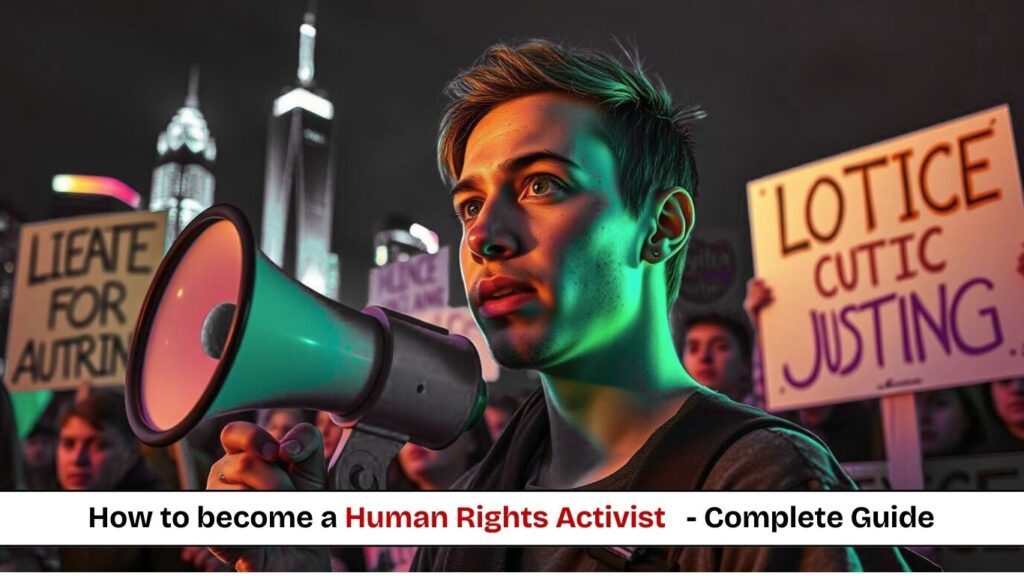
Introduction: The Power of Human Rights Advocacy
Human rights activists serve as society’s conscience, fighting injustice, protecting vulnerable populations, and holding power structures accountable. With global conflicts rising and 4.2 billion people living without meaningful access to justice (World Justice Project), the need for skilled activists has never been greater.
This comprehensive guide covers:
✔ Historical evolution of human rights movements
✔ 2024 compensation across advocacy sectors
✔ Core responsibilities and daily work
✔ Essential qualifications and skill sets
✔ Step-by-step career entry guide
✔ Future trends in digital activism and legal advocacy
Whether you’re drawn to grassroots organizing or international policy work, this guide illuminates pathways to create meaningful change.
History of Human Rights Activism
Early Foundations (Pre-20th Century)
- 1215: Magna Carta establishes rule of law principles
- 1789: French Revolution’s Declaration of Rights
- 1800s: Abolitionist movements gain momentum
Institutionalization Era (1900-1945)
- 1915: Formation of first international humanitarian groups
- 1920: League of Nations addresses minority rights
- 1945: UN Charter enshrines human rights
Modern Movements (1948-Present)
- 1948: Universal Declaration of Human Rights adopted
- 1960s-70s: Civil rights and feminist movements
- 1990s: International Criminal Court established
- 2000s: Digital activism transforms advocacy
- 2020s: AI ethics and climate justice emerge
Human Rights Activist Salaries (2024)
Compensation varies widely by sector and experience:
| Position | Nonprofit | Government | UN Agencies | Private Sector |
|---|---|---|---|---|
| Field Researcher | $38,000 | $52,000 | $62,000 | N/A |
| Policy Advocate | $55,000 | $75,000 | $85,000 | $110,000 |
| Program Director | $70,000 | $95,000 | $110,000 | $150,000+ |
Top-Paying Sectors:
- Corporate Social Responsibility (Tech firms)
- International Courts (Legal roles)
- UN Specialized Agencies
Global Salary Benchmarks:
- UK: £30,000-£80,000
- Kenya: $24,000-$60,000 (regional hubs)
- Switzerland: CHF 85,000-CHF 150,000 (Geneva-based)
Roles & Responsibilities
Direct Advocacy Work
- Documenting abuses through field research
- Organizing campaigns and protests
- Lobbying policymakers for legal reforms
Legal & Policy Functions
- Drafting shadow reports for UN reviews
- Representing victims in court cases
- Monitoring treaty compliance
Community Engagement
- Conducting human rights education
- Building grassroots networks
- Training local advocates
Specialized Focus Areas
- Digital rights and surveillance
- Climate justice litigation
- Business & human rights
Education & Qualifications
Minimum Requirements
- Bachelor’s in:
- Human Rights
- International Relations
- Political Science
Advanced Pathways
- Master’s in:
- Humanitarian Action
- International Law
- Transitional Justice
Essential Certifications
✔ Human Rights Monitoring (HURIDOCS)
✔ Security Training for Activists
✔ UN Human Rights Mechanisms
Critical Skills
- Multilingual abilities
- Legal research/writing
- Crisis mapping tools
- Trauma-informed interviewing
How to Become a Human Rights Activist
Step 1: Build Foundations
- Volunteer with:
- Local civil rights groups
- Prisoner advocacy organizations
- Immigrant support networks
Step 2: Gain Specialized Experience
- Entry-level positions:
- Research Assistant (35,000−35,000−45,000)
- Field Officer (40,000−40,000−55,000)
Step 3: Develop Expertise
- Transitional justice
- Corporate accountability
- Digital forensics
Step 4: Advance Your Impact
- Leadership paths:
- UN Special Rapporteur
- Litigation Director
- Movement Strategist
Future of Human Rights Activism
Growing Challenges
- Shrinking civic space in 68 countries (CIVICUS)
- AI-enabled surveillance threats
- Climate displacement crises
Emerging Opportunities
- Digital Rights Advocacy
- Fighting algorithmic discrimination
- Blockchain for activist security
- Strategic Litigation
- Climate justice cases
- Meta/Google accountability suits
- Localization Movements
- Decolonizing humanitarianism
- Southern-led initiatives
- New Accountability Mechanisms
- EU supply chain laws
- ICC environmental crimes focus
Is Human Rights Work Right For You?
Ideal Candidates Possess:
✔ Relentless commitment to justice
✔ Emotional resilience
✔ Cultural humility
✔ Strategic creativity
Career Pathways:
➔ International Criminal Law
➔ Corporate Accountability
➔ Digital Security Training
➔ Policy Development
Getting Started Today:
- Complete Amnesty International’s online courses
- Attend UN Human Rights Council sessions (open to public)
- Build language skills (French/Arabic/Spanish critical)
- Document local rights issues through verified methods
Conclusion: Your Journey to Making Impact
Human rights activism offers unparalleled opportunities to:
✓ Protect fundamental freedoms
✓ Innovate new accountability systems
✓ Build solidarity across movements
Begin your path by:
- Grounding in historical movements
- Developing specialized monitoring skills
- Connecting with established organizations













Post Comment